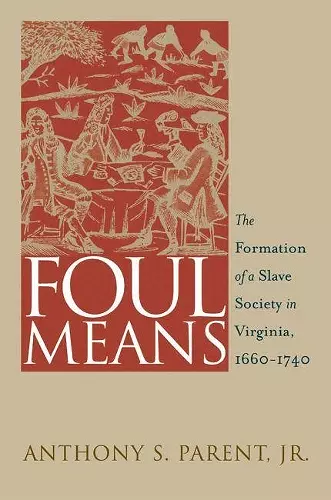Foul Means
The Formation of a Slave Society in Virginia, 1660-1740
Format:Paperback
Publisher:The University of North Carolina Press
Published:30th Sep '03
Should be back in stock very soon

Challenging the generally accepted belief that the introduction of racial slavery to America was an unplanned consequence of a scarce labor market, Anthony Parent, Jr., contends that during a brief period spanning the late seventeenth and early eighteenth centuries a small but powerful planter class, acting to further its emerging economic interests, intentionally brought racial slavery to Virginia. Parent bases his argument on three historical developments: the expropriation of Powhatan lands, the switch from indentured to slave labor, and the burgeoning tobacco trade. He argues that these were the result of calculated moves on the part of an emerging great planter class seeking to consolidate power through large landholdings and the labor to make them productive. To preserve their economic and social gains, this planter class inscribed racial slavery into law. The ensuing racial and class tensions led elite planters to mythologize their position as gentlemen of pastoral virtue immune to competition and corruption. To further this benevolent image, they implemented a plan to Christianize slaves and thereby render them submissive. According to Parent, by the 1720s the Virginia gentry projected a distinctive cultural ethos that buffered them from their uncertain hold on authority, threatened both by rising imperial control and by black resistance, which exploded in the Chesapeake Rebellion of 1730. |Offering a provocative black interpretation of the development of slavery, Parent argues that during a brief period spanning the late 17th and early 18th centuries, a small but powerful planter class brought racial slavery to Virginia, and, in turn, to America. Parent finds more evidence of pervasive black rebellions during this period than previous historians have suggested, especially the Chesapeake Rebellion of 1730, the largest continental slave rebellion during the colonial era.
ISBN: 9780807854860
Dimensions: unknown
Weight: 460g
312 pages
New edition